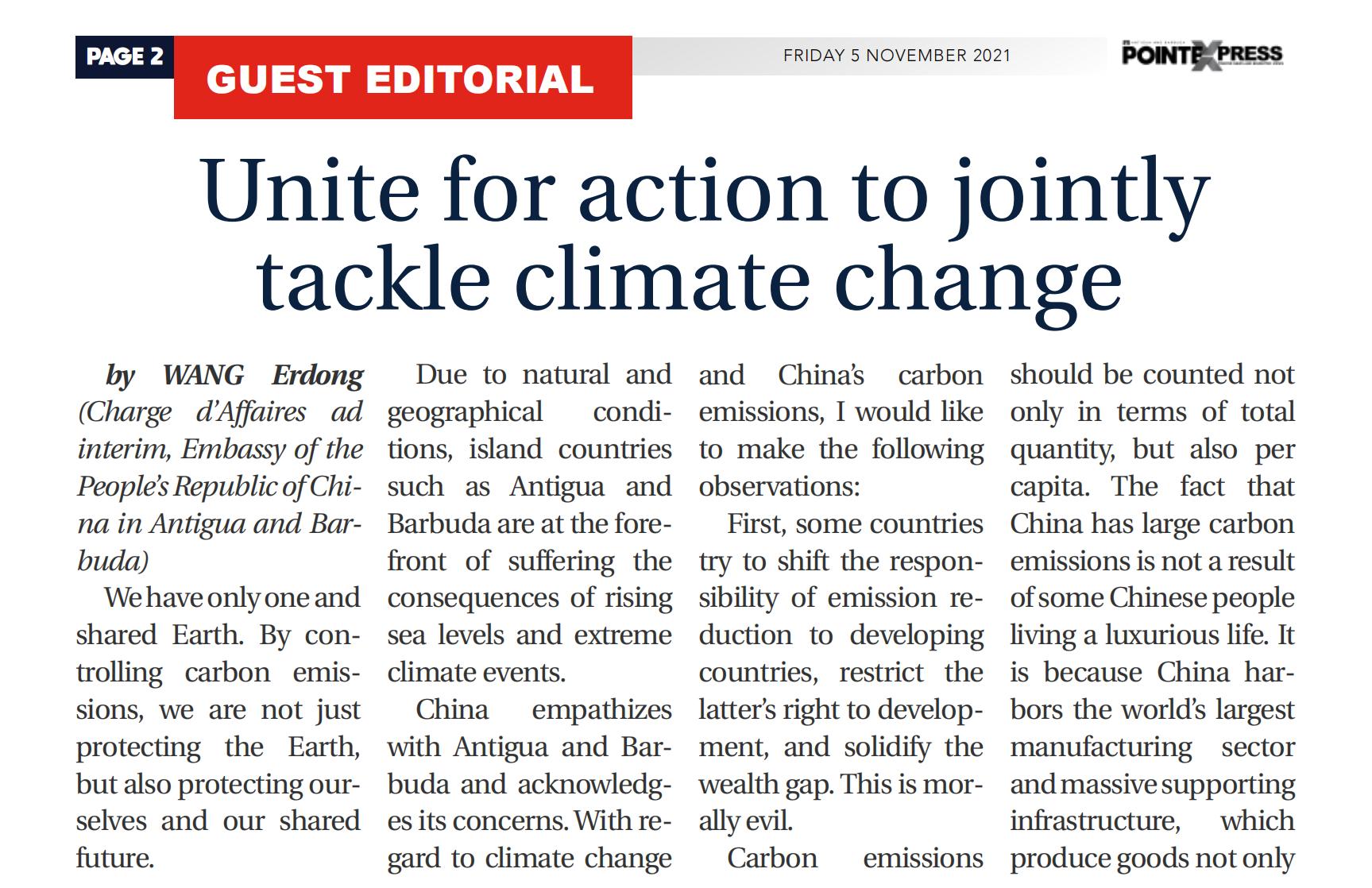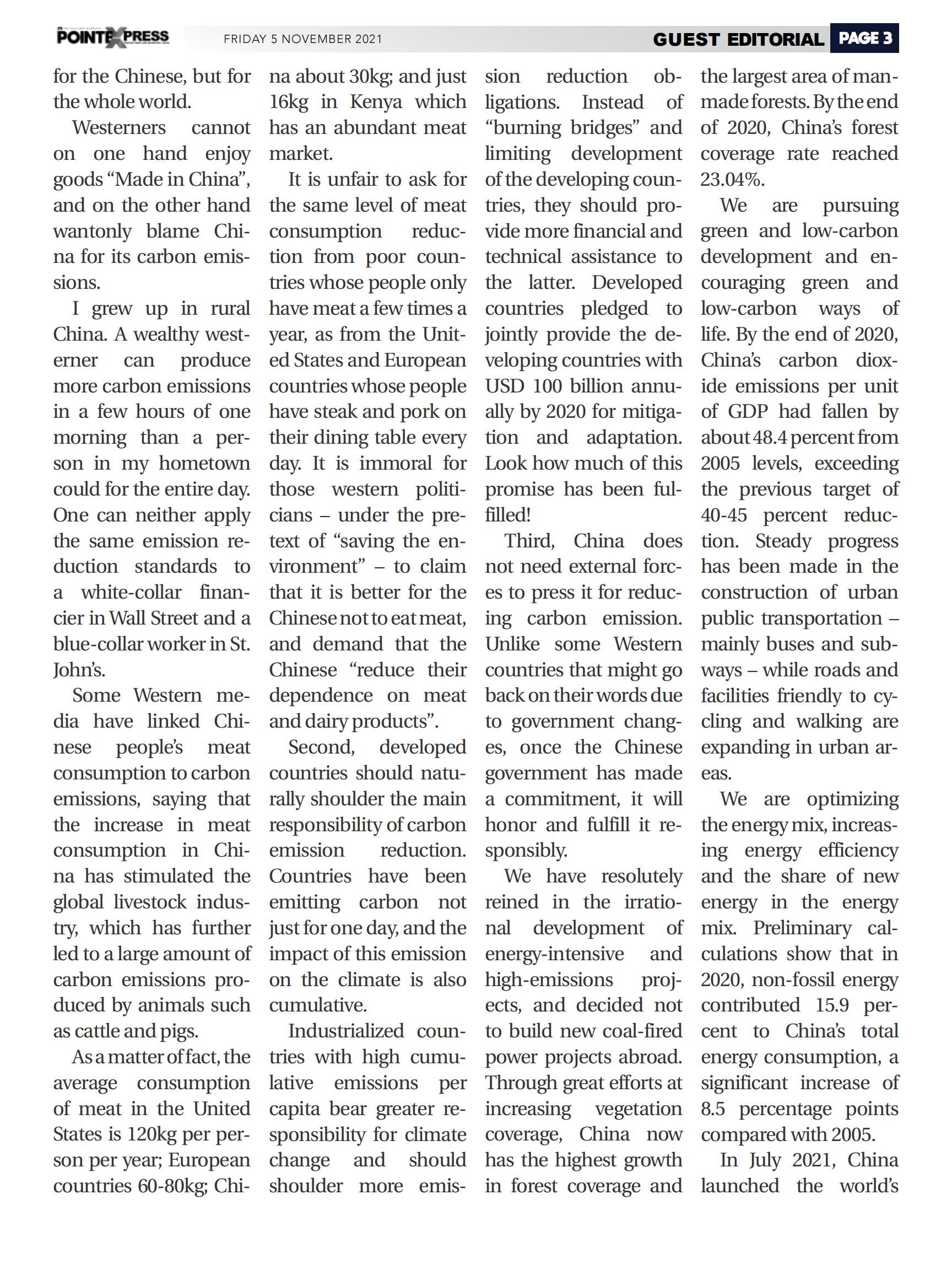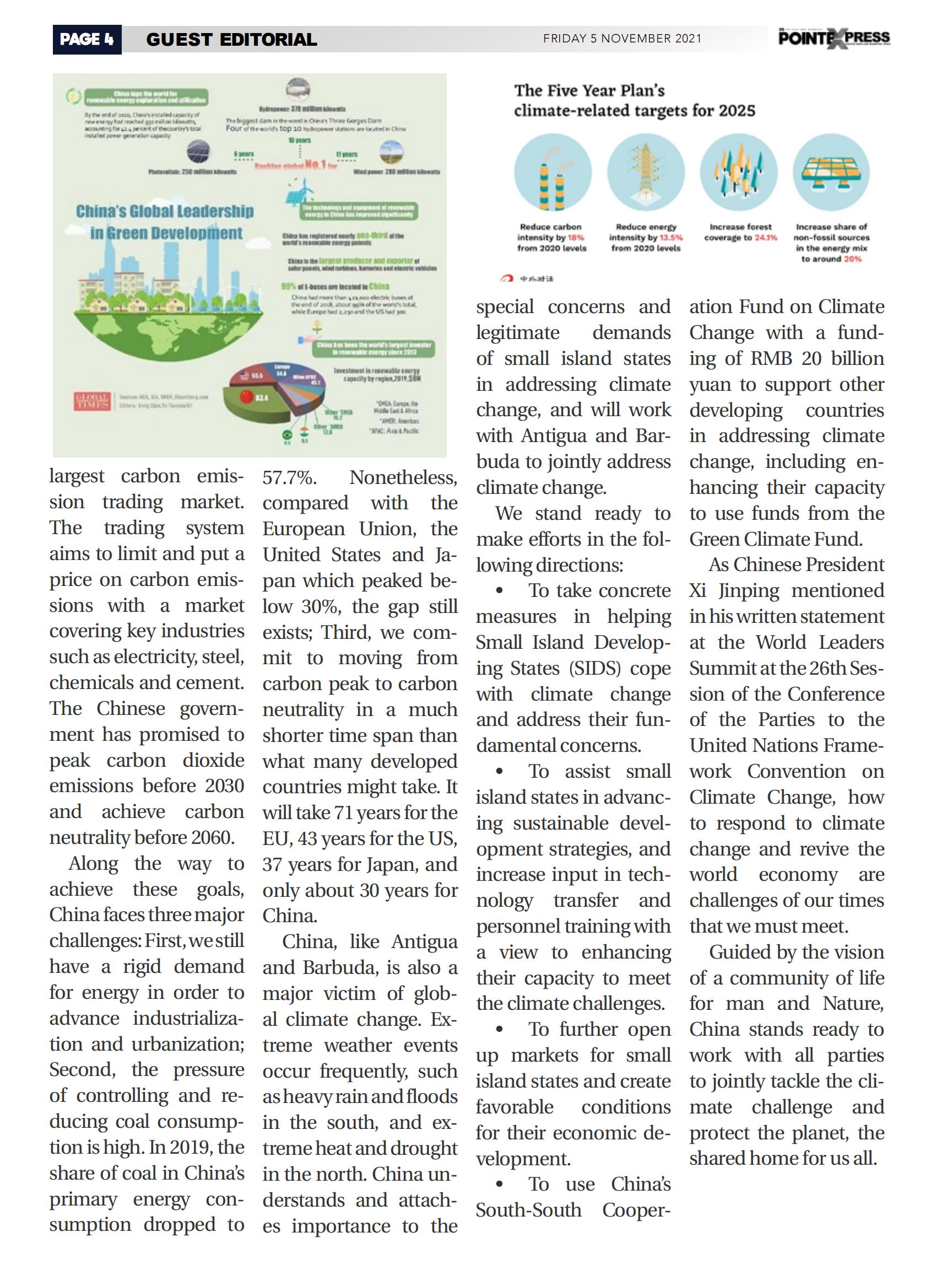On 5th November, 2021, the POINTEXPRESS carried an article authored by Mr. Wang Erdong, Charge d'Affaires ad interim of Embassy of the People's Republic of China in Antigua and Barbuda, titled"Unite for action to jointly tackle climate change". The full text is as follows:



We have only one and shared Earth. By controlling carbon emissions, we are not just protecting the Earth, but also protecting ourselves and our shared future.
Due to natural and geographical conditions, island countries such as Antigua and Barbuda are at the forefront of suffering the consequences of rising sea levels and extreme climate events.
China empathizes with Antigua and Barbuda and acknowledges its concerns. With regard to climate change and China's carbon emissions, I would like to make the following observations:
First, some countries try to shift the responsibility of emission reduction to developing countries, restrict the latter’s right to development, and solidify the wealth gap. This is morally evil.
Carbon emissions should be counted not only in terms of total quantity, but also per capita. The fact that China has large carbon emissions is not a result of some Chinese people living a luxurious life. It is because China harbors the world's largest manufacturing sector and massive supporting infrastructure, which produce goods not only for the Chinese, but for the whole world.
Westerners cannot on one hand enjoy goods “Made in China”, and on the other hand wantonly blame China for its carbon emissions.
I grew up in rural China. A wealthy westerner can produce more carbon emissions in a few hours of one morning than a person in my hometown could for the entire day. One can neither apply the same emission reduction standards to a white-collar financier in Wall Street and a blue-collar worker in St. John's.
Some Western media have linked Chinese people's meat consumption to carbon emissions, saying that the increase in meat consumption in China has stimulated the global livestock industry, which has further led to a large amount of carbon emissions produced by animals such as cattle and pigs.
As a matter of fact, the average consumption of meat in the United States is 120kg per person per year; European countries 60-80kg; China about 30kg; and just 16kg in Kenya which has an abundant meat market.
It is unfair to ask for the same level of meat consumption reduction from poor countries whose people only have meat a few times a year as from the United States and European countries whose people have steak and pork on their dining table every day. It is immoral for those western politicians – under the pretext of "saving the environment" – to claim that it is better for the Chinese not to eat meat, and demand that the Chinese "reduce their dependence on meat and dairy products".
Second, developed countries should naturally shoulder the main responsibility of carbon emission reduction. Countries have been emitting carbon not just for one day, and the impact of this emission on the climate is also cumulative.
Industrialized countries with high cumulative emissions per capita bear greater responsibility for climate change and should shoulder more emission reduction obligations. Instead of "burning bridges" and limiting development of the developing countries, they should provide more financial and technical assistance to the latter. Developed countries pledged to jointly provide the developing countries with USD 100 billion annually by 2020 for mitigation and adaptation. Look how much of this promise has been fulfilled!
Third, China does not need external forces to press it for reducing carbon emission. Unlike some Western countries that might go back on their words due to government changes, once the Chinese government has made a commitment, it will honor and fulfill it responsibly.
We have resolutely reined in the irrational development of energy-intensive and high-emissions projects, and decided not to build new coal-fired power projects abroad. Through great efforts at increasing vegetation coverage, China now has the highest growth in forest coverage and the largest area of man-made forests. By the end of 2020, China's forest coverage rate reached 23.04%.
We are pursuing green and low-carbon development and encouraging green and low-carbon ways of life. By the end of 2020, China's carbon dioxide emissions per unit of GDP had fallen by about 48.4 percent from 2005 levels, exceeding the previous target of 40-45 percent reduction. Steady progress has been made in the construction of urban public transportation – mainly buses and subways – while roads and facilities friendly to cycling and walking are expanding in urban areas.
We are optimizing the energy mix, increasing energy efficiency and the share of new energy in the energy mix. Preliminary calculations show that in 2020, non-fossil energy contributed 15.9 percent to China’s total energy consumption, a significant increase of 8.5 percentage points compared with 2005.
In July 2021, China launched the world's largest carbon emission trading market. The trading system aims to limit and put a price on carbon emissions with a market covering key industries such as electricity, steel, chemicals and cement.
The Chinese government has promised to peak carbon dioxide emissions before 2030 and achieve carbon neutrality before 2060.
Along the way to achieve these goals, China faces three major challenges: First, we still have a rigid demand for energy in order to advance industrialization and urbanization; Second, the pressure of controlling and reducing coal consumption is high. In 2019, the share of coal in China's primary energy consumption dropped to 57.7%. Nonetheless, compared with the European Union, the United States and Japan which peaked below 30%, the gap still exists; Third, we commit to moving from carbon peak to carbon neutrality in a much shorter time span than what many developed countries might take. It will take 71 years for the EU, 43 years for the US, 37 years for Japan, and only about 30 years for China.
China, like Antigua and Barbuda, is also a major victim of global climate change. Extreme weather events occur frequently, such as heavy rain and floods in the south, and extreme heat and drought in the north. China understands and attaches importance to the special concerns and legitimate demands of small island states in addressing climate change, and will work with Antigua and Barbuda to jointly address climate change.
We stand ready to make efforts in the following directions:
➢ To take concrete measures in helping Small Island Developing States (SIDS) cope with climate change and address their fundamental concerns.
➢ To assist small island states in advancing sustainable development strategies, and increase input in technology transfer and personnel training with a view to enhancing their capacity to meet the climate challenges.
➢ To further open up markets for small island states and create favorable conditions for their economic development.
➢ To use China’s South-South Cooperation Fund on Climate Change with a funding of RMB 20 billion yuan to support other developing countries in addressing climate change, including enhancing their capacity to use funds from the Green Climate Fund.
As Chinese President Xi Jinping mentioned in his written statement at the World Leaders Summit at the 26th Session of the Conference of the Parties to the United Nations Framework Convention on Climate Change, how to respond to climate change and revive the world economy are challenges of our times that we must meet. Guided by the vision of a community of life for man and Nature, China stands ready to work with all parties to jointly tackle the climate challenge and protect the planet, the shared home for us all.